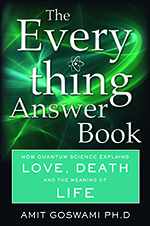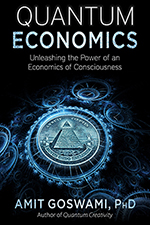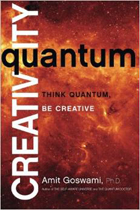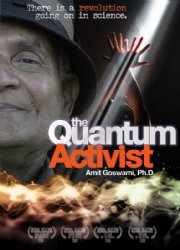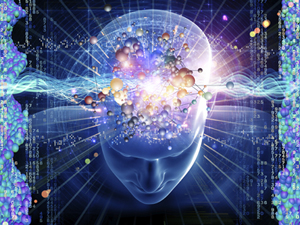 Connoisseurs know that my work on quantum consciousness has much to say about how to frame a scientific psychology that integrates all of psychology and most of psychotherapy. I presented my vision for a quantum psychology at a conference in Paris in May, 2013. Here is a gist of it.
Connoisseurs know that my work on quantum consciousness has much to say about how to frame a scientific psychology that integrates all of psychology and most of psychotherapy. I presented my vision for a quantum psychology at a conference in Paris in May, 2013. Here is a gist of it.
What is quantum psychology? Quantum psychology is based on quantum principles. Its primary premise is that all objects of our experience—sensing, feeling, thinking, and intuiting—are quantum objects that have a two realm existence—possibility and actuality. As quantum possibilities, they are embedded in a holistic nonlocal consciousness; as actualities they make up four independent worlds: the physical (for sensing), the vital (for feeling), the mental (for thinking meaning), the archetypal or supramental (for intuiting). These worlds do not directly interact; their interactions are mediated by the signaless communication of nonlocal consciousness.
Why quantum psychology? Quantum psychology is necessary to resolve all the dichotomies of our experiences and in this way integrate all the psychologies that treat all the varieties of our experiences piecemeal.
Where do we apply quantum psychology? Well, there is politics here and vested interests that want to keep away the new. The new makes people defensive especially when we are talking about big changes like a paradigm shift. I think the application will begin with you the lay-reader first who like self-help for which quantum psychology is appropriate as you will see when the project is finished. Individual therapists will adapt some of the practices of quantum psychology piecemeal next. With time, as the philosopher Thomas Kuhn said, old paradigmers never change, but they do die. I think the new generation of psychologists will see the strength of the quantum integral approach quickly, one unified science within consciousness quickly and from then on, there is no going back. When the younger generation takes over the academe, academe will change.
When will the transition be complete? A few decades perhaps.
How? We need activism. There is a danger in what is happening with materialist science, especially psychology, that surreptitiously is killing the individualistic human spirit that has made America, but few people notice it. Materialist psychology is objective; for materialists it is best if everybody were just the average Joe or Jane because prediction and control would be so simple then. Today, journalists and politicians talk about rampant individualism, but what they mean is narcissism, a very predictable self-centered mold in which everybody fits in. The alternative psychologies, especially depth psychology, humanistic psychology, and positive psychology promote and uphold the individual through the emphasis of their very individual creative pursuit of the timeless archetypes. The average approach in any garb, be it cognitive/behavioral science or Ken Wilber’s type of integral psychology, that tries to undermine the age-old archetypes is ultimately the biggest threat to the real American individuality, to the American dream.
As James Hillman said, “{Ordinary] activism looks to the facts, psychological activism inquires into essences.” Depth psychologists already talk about archetypal activism. If we don’t save the absolute archetypes of timeless truth, we get Fox news. Quantum psychology has an even more general suggestion: quantum activism. The motto of quantum activism is to change yourself to excel in your individuality (Carl Jung called this individuation) and simultaneously help the society to become a collection of heterogeneous individuals, not homogeneous machines!
When Integral Psychology is at hand, what then?: The Vision of Quantum Psychology.
In quantum psychology we recognize the full import of what the humanistic psychologist Carl Rogers first hinted: to become a person, we need to be the proud creative producer of a new idea that is my idea. Until that happens, face it: we are just repeating and analyzing other people’s ideas and opinions. To become a quantum society we have to change the essence of society from conditioning to creativity; we have to help others in the society to be creative.
What if somebody has neurosis so severe that creativity is impossible, the rigor of the creative process is unbearable. The quantum psychotherapist (and I don’t necessarily mean a professional) has to lend to such a person his or her creative acumen. If not you, who will? Remember the cognitive/behavioral therapists will always try to adapt their clients to the established cultural complex.
How to do it? Quantum physics has given us two ideas with which to move from “I” to “we” consciousness. The first idea is nonlocality. When I am influencing somebody through local means, local communication, I try to homogenize the person with me—simple human nature. When I communicate with someone with nonverbal and nonlocal consciousness, I empower him or her with the creative power of downward causation.
Have you noticed how in the current culture, locality has taken over as our means of communication? Locality gives us a sense of connectedness—that part is good. But the tendency to homogenize is the problem. We should use the local to connect, but use the connection to trigger and explore our nonlocal consciousness so all of us can prosper individually to fulfill our own creative agenda.
For the therapist or activist helper, what works better is establish a tangled hierarchical connection of circular causality with the client and investigate the archetype of wholeness together. If that sounds intriguing, it is not that hard, you will see.
Ken Wilber gave us the idea of a four-quadrant consciousness that introduced the notion of “we”-psychology. Unfortunately, Wilber meant the cultural we, the local homogeneous we. Quantum psychology is much more ambitious, much more in tune with the creative purpose of the evolution of consciousness.
The poet John Keats wrote: See the world as Vale for soul-making.
If you do, he wrote to a friend, you will see the purpose of the world. The soul is our archetypal body, the body that we cannot manifest yet except through mental creativity. But so long as we are creative, and helping others to be creative, we are okay, we are into soul-making.
